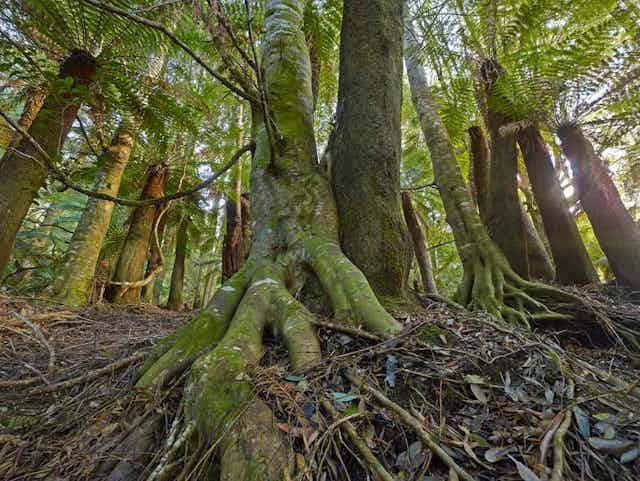Australia’s new government plans to axe not only the carbon price, but also iconic, World Heritage-listed, Tasmanian forests. Opening these forests for logging would break international law, and that would damage Australia’s reputation, demand for forestry products, and Tasmania’s clean, green brand upon which other industries rely.
In June this year, the World Heritage Committee approved Australia’s request to expand the Tasmanian Wilderness World Heritage Area by more than 170,000 hectares. The expansion was along the area’s northern (Great Western Tiers) and eastern (valleys of the Huon, Weld, Styx and upper Florentine) boundaries.
As Australia’s Environment Department states, in addition to listing glacial alpine areas such as Mt Field National Park:
The extension [protects] additional areas of exceptional beauty, particularly majestic stands of tall eucalypt forests… increases the extent of wet eucalypt forests within the property and will enhance the connectivity between its tall eucalypt forest and rainforest.
Additional important habitat for rare and threatened species such as the endangered wedge-tailed eagle and the Tasmanian devil are also included in the boundary extension.
The extension is the most important conservation result from the Tasmanian Forest Agreement between the Australian and Tasmanian Governments.
Coalition seeks World Heritage removal for logging
The Coalition’s forestry spokesman said this week “I have already written to the World Heritage Council [sic] seeking to have these areas removed”.
That’s premature: Australian law makes meeting World Heritage obligations the Environment Minister’s responsibility.

Tasmanian Liberal Opposition leader Will Hodgman said this week that if elected in March 2014, he would send the state-owned corporation Forestry Tasmania into the delisted World Heritage areas to log specialty [old growth rainforest] timbers:
We’d allow that to happen and to provide that resource that’s needed to grow the industry … including in the recently listed world-heritage area.
Logging a World Heritage area would ruin Australia’s reputation
Logging this area would be unlawful. The World Heritage Committee’s decision was supported by voluminous documentation. It authoritatively confirms the forests’ World Heritage significance or “outstanding universal value”.
Logging such forests (even after delisting) would breach Australia’s international law obligations under the World Heritage Convention and the Vienna Convention on the Law of Treaties.
It could also put all of Tasmania’s Wilderness World Heritage on the In Danger list. World Heritage expert Professor Peter Valentine has flagged that the Committee would see “Any threat to [newly listed forests as] a threat to the entire World Heritage area in Tasmania”. This could place the entire property on the List of World Heritage in Danger.
The Convention’s Operational Guidelines include “Severe deterioration of the natural beauty or scientific value of the property, as by … logging” as a ground for the Committee listing a property as In Danger. That listing is a precursor to its ultimate sanction of removal from the World Heritage List.
Normally, nations fight to keep their World Heritage properties off the In Danger list, as Australia did over uranium mining in Kakadu, and when rabbits were ravaging Macquarie Island. Australia is now trying to stop the Great Barrier Reef being placed on the In Danger list.
If Australia logs its World Heritage forests, it could only exacerbate the Committee’s current concern for the Great Barrier Reef.
Unlawful World Heritage logging, let alone In Danger listing, would damage Australia’s reputation, given nearly all nations are Parties to the World Heritage Convention.
Opposition environment spokesman Greg Hunt said of reversing these forests’ listing: “We can work with the international community on this. It’s not difficult. It’s what governments do all the time.”
Diplomacy yes; but not World Heritage delisting. That has occurred only twice before. The closest parallel to a government deliberately damaging World Heritage values is the Taliban dynamiting two giant Bamiyan Buddha statues in 2001.

Bad news for Tasmania
World Heritage logging and associated controversy would also harm Tasmania’s clean, green brand on which other industries such tourism, agriculture and aquaculture rely.
The main rationale for the delisting plan is that the Coalition wants to do everything possible to “unpick” the Tasmanian Forest Agreement.
World Heritage logging would strike at the TFA’s heart. It would deny Tasmania the Forest Stewardship Council (FSC) certification on which Japanese customers now insist, and escalate protests in the forests and markets.
As Acting Premier and Resources Minister Bryan Green stated:
International customers have made it very clear they want the unrest to stop, they want certified timber products and they support the objectives of the TFA. The TFA gives us the opportunity to not only regain markets that have been lost but to get the industry back on a growth path.
The representative bodies which negotiated the forests agreement are also publicly opposing the Coalition’s plan: the Forest Industries Association of Tasmania, sawmillers’ and forest contractors’ associations, the Construction Forestry Mining and Energy Union and environmental organisations.
World Heritage logging would be a giant leap backwards, plunging Tasmania back into the “forest wars” which have divided the island’s communities for decades.

